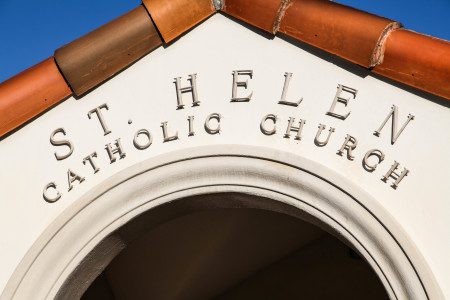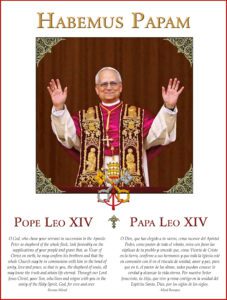Reading 1 Acts 8:26-40
The angel of the Lord spoke to Philip,
“Get up and head south on the road
that goes down from Jerusalem to Gaza, the desert route.”
So he got up and set out.
Now there was an Ethiopian eunuch,
a court official of the Candace,
that is, the queen of the Ethiopians,
in charge of her entire treasury,
who had come to Jerusalem to worship, and was returning home.
Seated in his chariot, he was reading the prophet Isaiah.
The Spirit said to Philip,
“Go and join up with that chariot.”
Philip ran up and heard him reading Isaiah the prophet and said,
“Do you understand what you are reading?”
He replied,
“How can I, unless someone instructs me?”
So he invited Philip to get in and sit with him.
This was the Scripture passage he was reading:
Like a sheep he was led to the slaughter,
and as a lamb before its shearer is silent,
so he opened not his mouth.
In his humiliation justice was denied him.
Who will tell of his posterity?
For his life is taken from the earth.
Then the eunuch said to Philip in reply,
“I beg you, about whom is the prophet saying this?
About himself, or about someone else?”
Then Philip opened his mouth and, beginning with this Scripture passage,
he proclaimed Jesus to him.
As they traveled along the road
they came to some water,
and the eunuch said, “Look, there is water.
What is to prevent my being baptized?”
Then he ordered the chariot to stop,
and Philip and the eunuch both went down into the water,
and he baptized him.
When they came out of the water,
the Spirit of the Lord snatched Philip away,
and the eunuch saw him no more,
but continued on his way rejoicing.
Philip came to Azotus, and went about proclaiming the good news
to all the towns until he reached Caesarea.
Responsorial Psalm Psalm 66:8-9, 16-17, 20
R.(1) Let all the earth cry out to God with joy.
or:
R. Alleluia.
Bless our God, you peoples,
loudly sound his praise;
He has given life to our souls,
and has not let our feet slip.
R. Let all the earth cry out to God with joy.
or:
R. Alleluia.
Hear now, all you who fear God, while I declare
what he has done for me.
When I appealed to him in words,
praise was on the tip of my tongue.
R. Let all the earth cry out to God with joy.
or:
R. Alleluia.
Blessed be God who refused me not
my prayer or his kindness!
R. Let all the earth cry out to God with joy.
or:
R. Alleluia.
Alleluia John 6:51
R. Alleluia, alleluia.
I am the living bread that came down from heaven, says the Lord;
whoever eats this bread will live forever.
R. Alleluia, alleluia.
Gospel John 6:44-51
Jesus said to the crowds:
“No one can come to me unless the Father who sent me draw him,
and I will raise him on the last day.
It is written in the prophets:
They shall all be taught by God.
Everyone who listens to my Father and learns from him comes to me.
Not that anyone has seen the Father
except the one who is from God;
he has seen the Father.
Amen, amen, I say to you,
whoever believes has eternal life.
I am the bread of life.
Your ancestors ate the manna in the desert, but they died;
this is the bread that comes down from heaven
so that one may eat it and not die.
I am the living bread that came down from heaven;
whoever eats this bread will live forever;
and the bread that I will give
is my Flesh for the life of the world.”
– – –
Lectionary for Mass for Use in the Dioceses of the United States, second typical edition, Copyright © 2001, 1998, 1997, 1986, 1970 Confraternity of Christian Doctrine; Psalm refrain © 1968, 1981, 1997, International Committee on English in the Liturgy, Inc. All rights reserved. Neither this work nor any part of it may be reproduced, distributed, performed or displayed in any medium, including electronic or digital, without permission in writing from the copyright owner.



